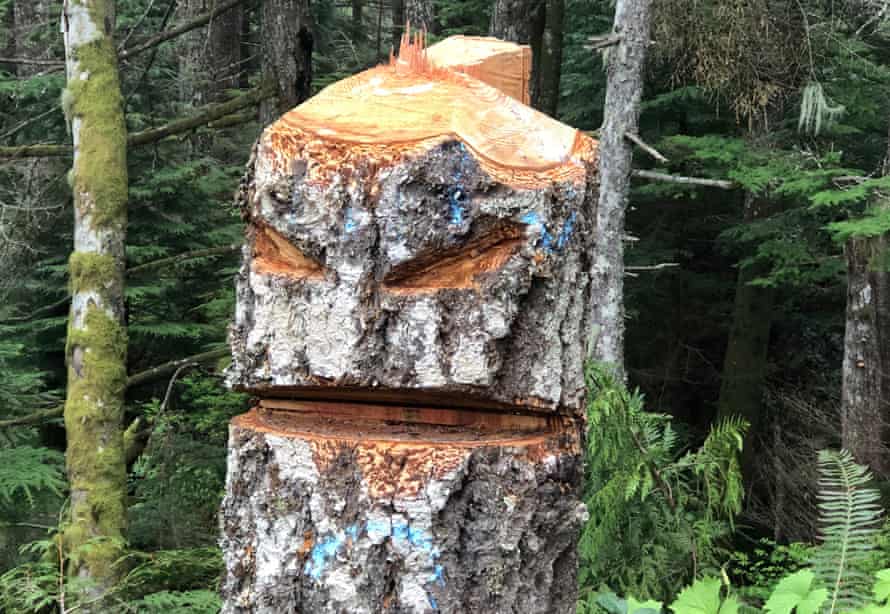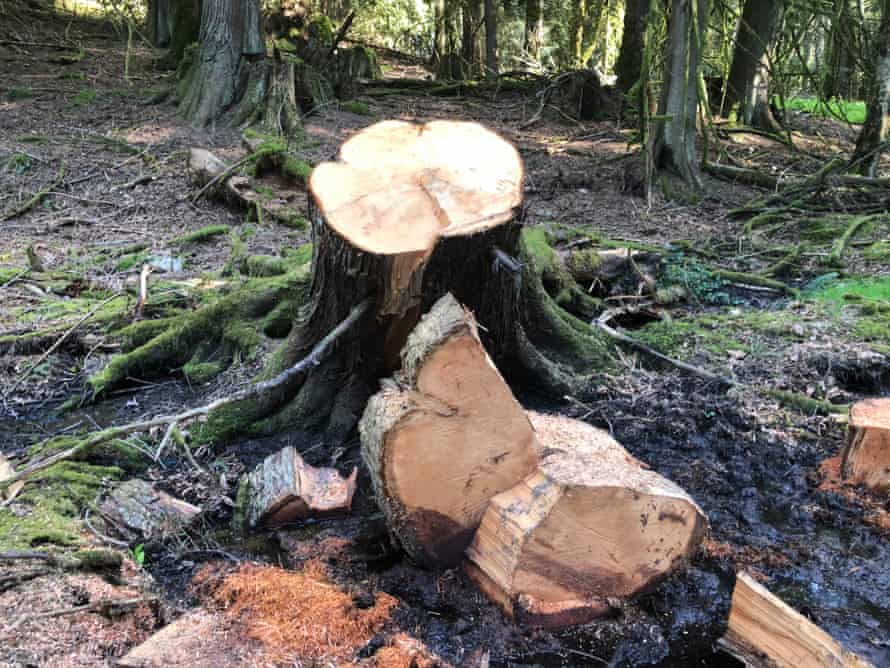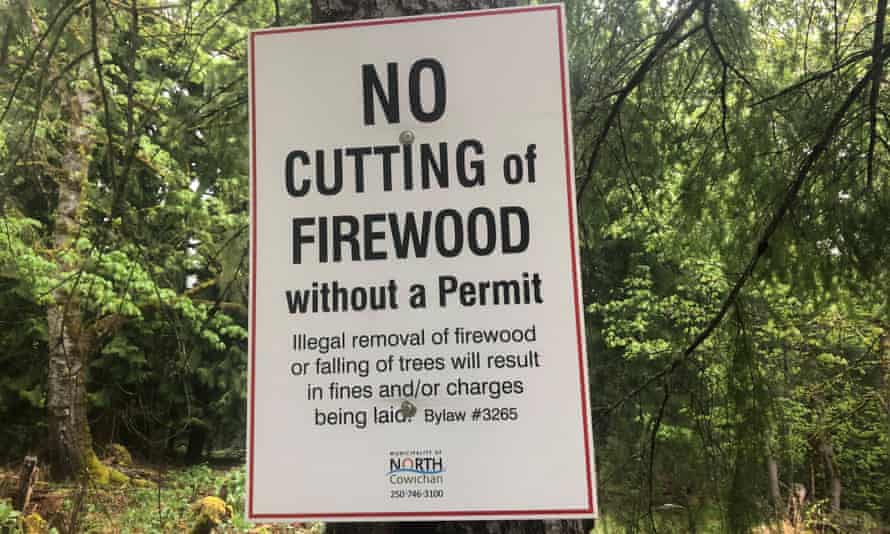Officials on Vancouver Island say at least 100 trees have been illegally cut down, leaving one stump with a face carved into it.
Last modified on 2021 May 13
–
Two tree stumps signaled to Larry Pynn that something was wrong.
–
Jutting from a mossy forest floor in western Canada, the fresh stumps were the final remnants of two western red cedars that had been chopped down by chainsaw. Nearby, a set of deep tire tracks ran for nearly a kilometer in the mud before terminating at the main road.
–
“I immediately suspected that this is the work of poachers,” said Pynn, a journalist who lives nearby. “These are clearly valuable trees and they were likely cut because of that.”
–
Since January, local officials on central Vancouver Island say at least 100 trees have been illegally chopped down. As lumber prices across the continent soar – prompting a flurry of memes and conspiracy theories – ecosystems full of valuable old growth trees have increasingly become a target for poachers.
–
The section of forest Pynn found the stumps in is part of a municipally owned 5,000 hectare swath of woods known locally as Six Mountains. The area, popular with hikers and mountain bikers, is also home to the endangered coastal Douglas fir ecosystem, which is on the verge of vanishing after centuries of logging and urban development.
–
Days after discovering the two stumps, Pynn spotted more trees in another section of the municipal forest reserve that had suffered a similar fate – and a menacing face carved into one of the stumps.
The first trees he spotted in the forest were probably worth close to C$1,000 (US$824) each for the raw wood. But the current fine for removing wood from the forest stands at C$200.
“It’s the same fine if you litter – there’s no deterrence,” said Pynn.
Poaching isn’t new to the area, but the scope and frequency have worsened in recent months, says Shaun Mason, a forester with the municipality.
While Douglas fir are often taken as firewood, he speculates poachers could be targeting cedar because of high lumber prices, which have nearly tripled over the last year – but has no firm evidence.
Timber marking systems are widely used to track the provenance of wood – and as a rule, mills won’t accept timber that hasn’t been marked. If the wood is milled down into boards, tracing its origins is nearly impossible.
“It’d be illegal, but if someone had a sawmill set up on their property and someone said, ‘Hey, I could get some cedar, would you mill it for me? You know, obviously, it’s not on the up and up, but it definitely could take place,” said Mason.
The poachers have used a number of tricks to hide their work, including placing moss over fresh stumps and covering tracks of their vehicles into the forest. Pynn suspects the culprits are operating under the cover of darkness.
The brazen thefts have left residents outraged and some have suggested banding together to patrol the area at night – a move Pynn says is probably too risky.
“I’m not sure it’s a great idea for people to be out in these areas at three in the morning,” he says.
–
In response to the thefts, the municipality has put up new signage, is patrolling the area daily and is looking at how to increase fines and installing video surveillance. Police have also been made aware of the issue. In recent weeks, the municipality has received dozens of tips from residents.
While the spike in poaching has centered on the small municipal reserve, Mason says the issue is probably far more widespread on Vancouver Island.
“It’s happening all over the place. We just happen to have un-gated, unfettered access, not that far from a main road or highway,” he said. “So we tend to be the easiest targets.”
For Jens Wieting of British Columbia’s Sierra Club, the spate of felled trees speaks to a broader crisis within the province. He points out that on Vancouver Island, the scale of legal old-growth logging still far outstrips recent poaching. If governments want to shift behaviour, far steeper fines are needed, he says.
“Maybe, with a change in perspective, people who might be tempted to make an extra buck by poaching trees won’t do it because they get a sense that it would be wrong – and that the consequences could be bigger and more serious.”
–
–
… we’d like to take a moment to say a big thank you, as it is not just our birthday: it’s yours as well. You might not have been around when we were born in 1821, but today your support is essential. It protects our vital independence, keeps us open to all, and motivates us to continue chasing the truth.
Join us this month as we celebrate 200 years of high-impact journalism, and gear up for centuries more. Times change, but principles don’t. For the last two centuries, tens of millions have placed their trust in our quality reporting, turning to us in moments of crisis, uncertainty, solidarity and hope. And this is just the beginning.
Thanks to funding from more than 1.5 million Guardian supporters like you, in 180 countries, we’ve remained fiercely independent. With no shareholders or billionaire owner, we provide truth-seeking journalism that’s free from commercial and political influence. We can investigate and challenge without fear or favor.
And because we believe in information equality, where everyone deserves access to reliable news and thoughtful analysis, we keep Guardian journalism open for all. Greater numbers of people can keep track of global events, understand their impact on people and communities, and become inspired to take meaningful action. This is only possible thanks to your support.
Whether you’re new to the Guardian – welcome – or have been with us for years, we hope you’ll stay with us as a valued reader and supporter. If you’d like to send a birthday contribution, you can, from just $1. Thank you again.











.png)






